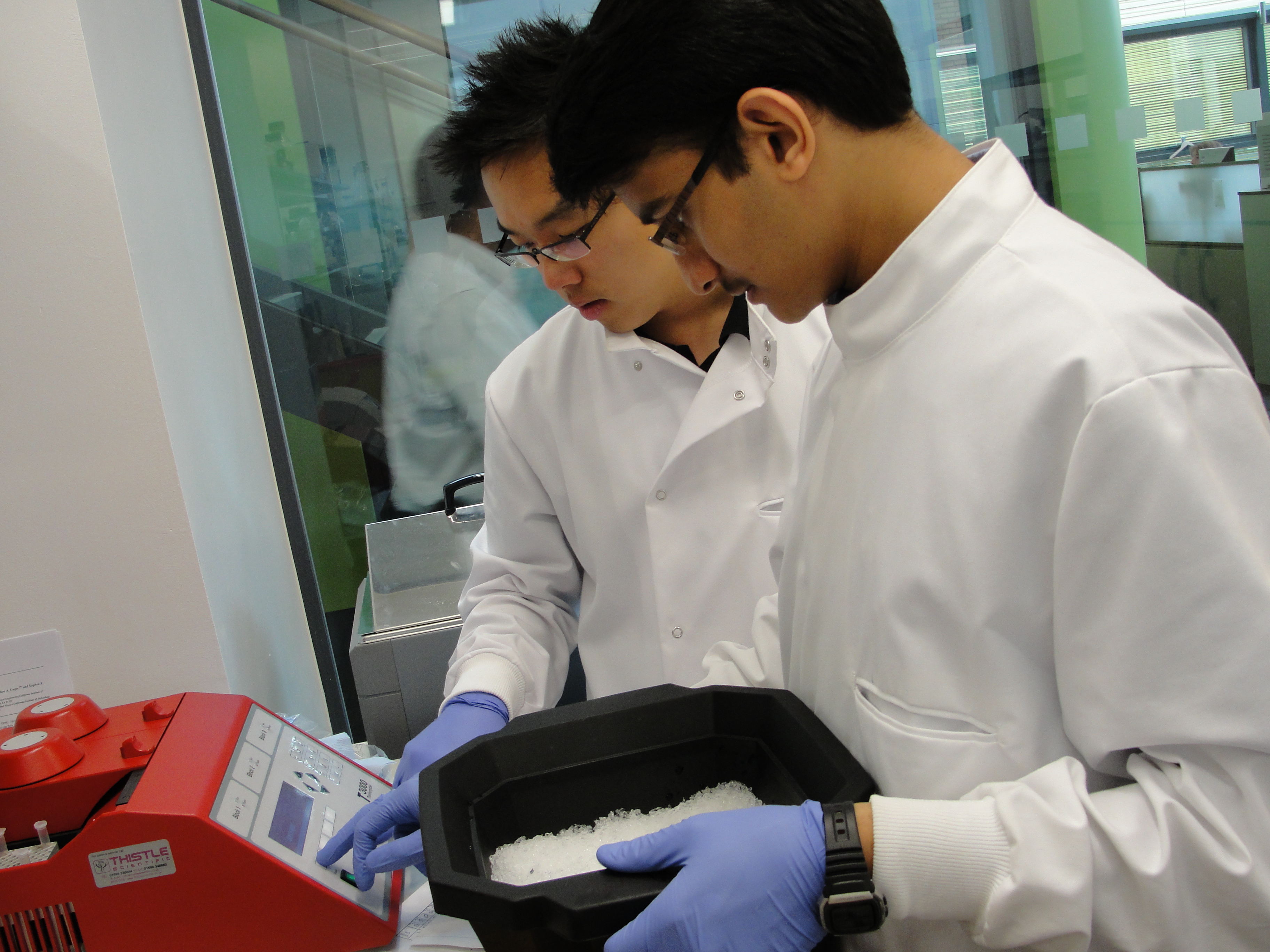Team:Newcastle/PCR
From 2010.igem.org
(Difference between revisions)
(→Conditions for ThermoCycler) |
|||
| (23 intermediate revisions not shown) | |||
| Line 1: | Line 1: | ||
{{Team:Newcastle/mainbanner}} | {{Team:Newcastle/mainbanner}} | ||
| - | + | [[Image:Newcastle_Thermo.JPG|300px|right|Thermocycler]] | |
=GoTaq PCR= | =GoTaq PCR= | ||
==Materials required== | ==Materials required== | ||
| - | Add the following as mentioned below to make up to a final volume of | + | Add the following as mentioned below to make up to a final volume of 50 µl in the PCR tube: |
# 32.5 µl of distilled H<sub>2</sub>O | # 32.5 µl of distilled H<sub>2</sub>O | ||
| Line 22: | Line 22: | ||
# Initialise - 95°C for 2 minutes. | # Initialise - 95°C for 2 minutes. | ||
# Denature - 95°C for 30 seconds. | # Denature - 95°C for 30 seconds. | ||
| - | # Anneal - | + | # Anneal - ~°C for 30 seconds (depends upon the melting temperature of template) |
# Extension - 75°C for 30 seconds | # Extension - 75°C for 30 seconds | ||
# Extension finish - 75°C for 5 minutes | # Extension finish - 75°C for 5 minutes | ||
# Hold - 4°C | # Hold - 4°C | ||
| + | |||
Steps 2 to 4 are repeated for 30 cycles before continuing to step 5. | Steps 2 to 4 are repeated for 30 cycles before continuing to step 5. | ||
| + | |||
| + | * Some important points to note while performing PCR are as following: | ||
| + | # Extension time depends on size of DNA and time used is 30 seconds/kb. | ||
| + | # PCR is best when everything is kept on ice! | ||
| + | # Melting temperatures for annealing step of primers is important and can have a big effect on the product formed. | ||
=Phusion PCR= | =Phusion PCR= | ||
==Materials required== | ==Materials required== | ||
| - | Add the following as mentioned below to make up to a final volume of | + | Add the following as mentioned below to make up to a final volume of 50 µl in the PCR tube: |
# 27.5 µl of distilled H<sub>2</sub>O | # 27.5 µl of distilled H<sub>2</sub>O | ||
| Line 40: | Line 46: | ||
# 5 µl backward primer | # 5 µl backward primer | ||
# 1 µl template DNA | # 1 µl template DNA | ||
| - | # 0.5 µl of | + | # 0.5 µl of Phusion polymerase |
==Conditions for ThermoCycler== | ==Conditions for ThermoCycler== | ||
| Line 47: | Line 53: | ||
# Initialise - 98°C for 30 seconds. | # Initialise - 98°C for 30 seconds. | ||
# Denature - 98°C for 10 seconds. | # Denature - 98°C for 10 seconds. | ||
| - | # Anneal - | + | # Anneal - Depends on the melting temperature, Tm of the primer and it lasts for 20 seconds. |
| - | # Extension - 72°C | + | # Extension - 72°C (The extension time depends on the the size of the fragment which is to be amplified). |
# Extension finish - 72°C for 5-10 minutes | # Extension finish - 72°C for 5-10 minutes | ||
# Hold - 4°C | # Hold - 4°C | ||
| + | |||
| + | * Some important points to note while performing Phusion PCR are as following: | ||
| + | # Annealing temperature of the primer depends on the GC content and thus before setting up the thermocycler, check the melting temperature once again online or on the notes provided by the company which made the primers. | ||
| + | # Rate of extension by Phusion polymerase is 1Kb/ 30 seconds and thus always set extension time based on the size of the fragment you are planning to amplify. Note that the least extension to be set is 10 seconds for the Phusion polymerase to work. | ||
| + | |||
Steps 2 to 4 are repeated for 30 cycles before continuing to step 5. | Steps 2 to 4 are repeated for 30 cycles before continuing to step 5. | ||
| + | |||
| + | '''Go back to our [[Team:Newcastle/Protocol list|Protocol List]]''' | ||
{{Team:Newcastle/footer}} | {{Team:Newcastle/footer}} | ||
Latest revision as of 14:44, 26 October 2010

| |||||||||||||
| |||||||||||||
Contents |
GoTaq PCR
Materials required
Add the following as mentioned below to make up to a final volume of 50 µl in the PCR tube:
- 32.5 µl of distilled H2O
- 10 µl of 5x GoTaq Buffer
- 1 µl of dNTPs
- 2.5 µl forward primer
- 2.5 µl backward primer
- 1 µl template DNA
- 0.5 µl of GoTaq polymerase
Conditions for ThermoCycler
After putting the PCR tubes in the thermocycler, set the thermocycler's condition as mentioned below:
- Initialise - 95°C for 2 minutes.
- Denature - 95°C for 30 seconds.
- Anneal - ~°C for 30 seconds (depends upon the melting temperature of template)
- Extension - 75°C for 30 seconds
- Extension finish - 75°C for 5 minutes
- Hold - 4°C
Steps 2 to 4 are repeated for 30 cycles before continuing to step 5.
- Some important points to note while performing PCR are as following:
- Extension time depends on size of DNA and time used is 30 seconds/kb.
- PCR is best when everything is kept on ice!
- Melting temperatures for annealing step of primers is important and can have a big effect on the product formed.
Phusion PCR
Materials required
Add the following as mentioned below to make up to a final volume of 50 µl in the PCR tube:
- 27.5 µl of distilled H2O
- 10 µl of 5x Buffer
- 1 µl of dNTPs
- 5 µl forward primer
- 5 µl backward primer
- 1 µl template DNA
- 0.5 µl of Phusion polymerase
Conditions for ThermoCycler
After putting the PCR tubes in the thermocycler, set the thermocycler's condition as mentioned below:
- Initialise - 98°C for 30 seconds.
- Denature - 98°C for 10 seconds.
- Anneal - Depends on the melting temperature, Tm of the primer and it lasts for 20 seconds.
- Extension - 72°C (The extension time depends on the the size of the fragment which is to be amplified).
- Extension finish - 72°C for 5-10 minutes
- Hold - 4°C
- Some important points to note while performing Phusion PCR are as following:
- Annealing temperature of the primer depends on the GC content and thus before setting up the thermocycler, check the melting temperature once again online or on the notes provided by the company which made the primers.
- Rate of extension by Phusion polymerase is 1Kb/ 30 seconds and thus always set extension time based on the size of the fragment you are planning to amplify. Note that the least extension to be set is 10 seconds for the Phusion polymerase to work.
Steps 2 to 4 are repeated for 30 cycles before continuing to step 5.
Go back to our Protocol List
 
|
 "
"
